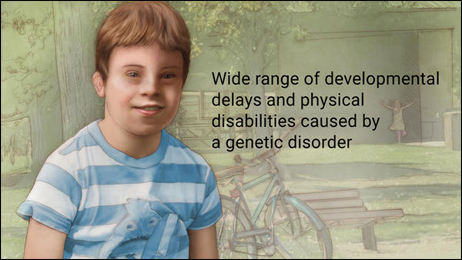Ayurvedic Treatment of Down Syndrome

About Down Syndrome
Down syndrome is a genetic disorder with abnormality in number of chromosomes where extra genetic material from chromosome 21 is transferred to a newly formed embryo, having 47 chromosomes in their cells instead of 46 (Normal number of Chromosomes), characterized by intellectual disability, a characteristic facial appearance, and weak muscle tone (hypotonia) in infancy. All affected individuals experience cognitive delays but the intellectual disability is usually mild to moderate. All person with Down syndrome are unique individual and may be characterized to different degrees, or not at all.
Causes of Down Syndrome
Every cell in the body comprises genes that are grouped along chromosomes in the nucleus of the cell. There are usually 46 number of chromosomes in each cell, 23 are inherited from mother and 23 from father. But in case of Down syndrome there is an extra full or partial copy of chromosome 21 some or all cells.
Types of Down Syndrome
1. Trisomy 21
Every cell of the affected child have three copies of chromosome 21 instead of the usual two copies. Affecting about 95 percent of people.
2. Mosaic Down syndrome
Type of Condition where child is born with an extra chromosome in some of the cells not all. It's a rare form of Down syndrome affecting about 2% of people
3. Translocation Down syndrome
It's a type where one of every cell has an extra piece of chromosome 21 attaches itself to another chromosome. It affects around 4% of people with Down's syndrome.
Risk Factors of Down syndrome
- Getting pregnant at older age for women age 35 and older
- Previous pregnancy with fetus had Down syndrome.
Symptoms of Down syndrome
Individuals with Down syndrome often have different physical characteristics, distinctive health issues, and variability in cognitive development.
1. Physical appearance
Individual of Down's syndrome are often characterized by certain physical features which may not be present in everyone, but they may have:
- Head is flat and small
- Protruding tongue is too large for the mouth
- Eyes are slanted upwards and white spots on the iris.
- Nose is small with flat nasal bridge.
- Hands are broad with short fingers.
- Ears are short and odd in appearance.
- Their palm may be characterized by only one crease across it
- Poor muscle tone.
- A wide space is present between first and second toe (sandal gap).
- Height and weight is usually below average.
2. Delayed development
- Every child with Down's syndrome will have learning disability to some extent and development is delayed, but these characteristics differ widely between individual children.
- Affected children may have slower skills to learn certain things as how to sit, stand, walk, and talk etc. They learn these skills but simply take more time.
- Speech and language development is also late.
- Other difficulties like autism spectrum disorder (ASD) or attention deficit hyperactivity disorder (ADHD) is present 1 in every 10 children.
3. Health problems
- Heart defects is in about half of the children of Down syndrome. Hypothyroidism, celiac disease, and diseased eye conditions are also seen.
- Respiratory infections, constipation, hearing problems, or dental problems are common in these children.

